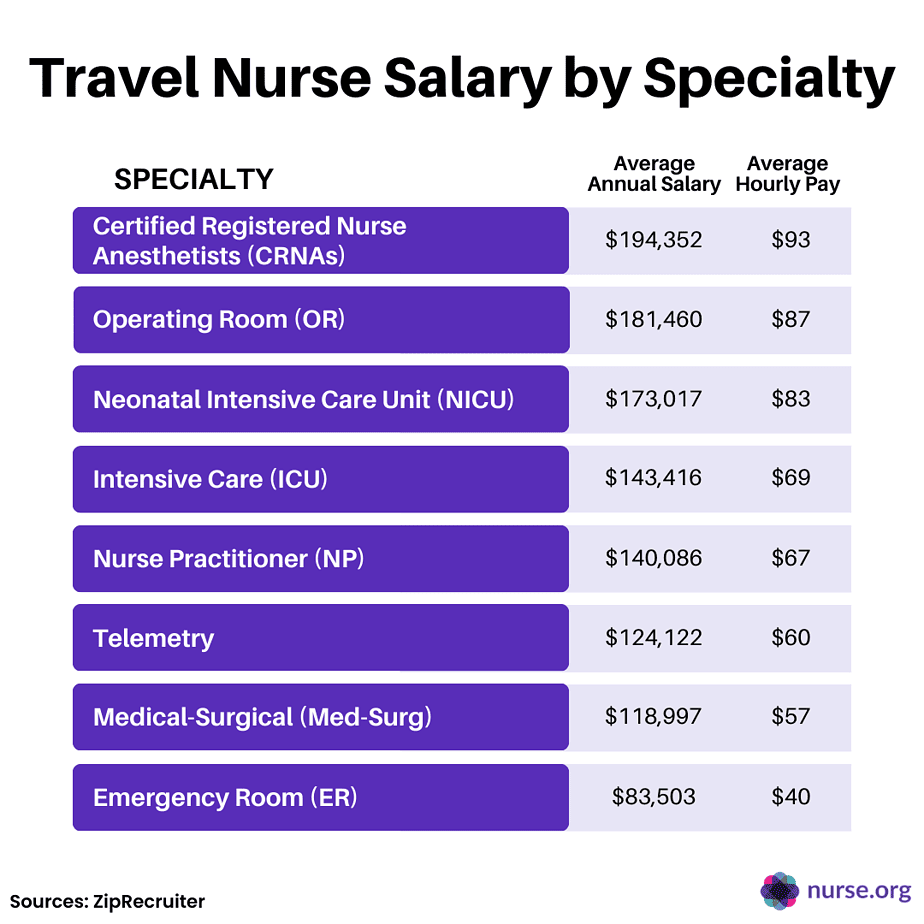Travel nursing is an exciting and fulfilling career path that allows nurses to explore new places while providing vital healthcare services. In this article, we delve into the world of travel nursing salary, shedding light on what they entail and the factors that influence them.
Discover how you can maximize your earnings as a travel nurse and unlock the financial rewards of this unique profession.
What is Travel Nursing Salary?
Explanation of Travel Nursing Salary:
Travel nursing salary refers to the compensation that travel nurses receive for their services. As travel nurses work on temporary assignments in various healthcare facilities, their salaries differ from those of traditional full-time nurses.
The structure of travel nursing salaries can vary, but they typically consist of a base pay rate plus additional benefits and incentives. The base pay rate is often higher than what a staff nurse would earn in a permanent position. This is because travel nurses are highly sought after due to their flexibility, ability to adapt quickly, and willingness to work in locations experiencing staffing shortages.
In addition to the base pay, travel nurses may receive various benefits, such as housing allowances or accommodations, travel reimbursements, health insurance, retirement plans, and bonuses. These benefits can significantly enhance the overall compensation package and make travel nursing an attractive career choice.
The specific salary for a travel nurse depends on several factors, including the location of the assignment, the demand for nurses in that area, the nurse’s level of experience and specialization, the duration of the assignment, and any additional certifications or skills they possess. High-demand locations or specialties may offer higher salaries due to the need for healthcare professionals in those areas.
Factors that Impact Travel Nursing Salaries:
Various factors influence travel nursing salaries, including location, demand, experience, specialization, and the specific terms of each assignment. Understanding these factors is crucial to comprehending the earning potential of travel nursing.

Understanding Travel Nursing Pay Structures
Hourly Rate vs. Weekly Rate:
Travel nurses typically receive either an hourly rate or a weekly rate. Hourly rates are common for assignments where nurses are paid based on the number of hours worked, while weekly rates provide a fixed salary regardless of the actual hours worked.
Additional Compensation and Benefits:
Travel nursing salaries often include additional compensation and benefits. These can encompass housing allowances, travel reimbursements, healthcare benefits, retirement plans, and bonuses. These perks contribute to the overall financial package and can vary depending on the travel nursing agency and assignment.
Average Travel Nursing Salaries
National Average Salary Range:
The national average salary for travel nurses varies based on factors such as location, specialty, experience, and demand. On average, travel nursing salaries can range from $60,000 to $100,000 per year, with variations depending on these factors.
| Experience Level | Average Annual Salary Range |
|---|---|
| Entry-level | $60,000 – $75,000 |
| Mid-level | $75,000 – $95,000 |
| Experienced | $95,000 – $120,000 |
| Advanced | $120,000 – $150,000+ |
Variations by Specialty and Location:
Certain specialties, such as critical care, emergency room, and operating room nursing, may command higher salaries due to their specialized skills and demand. Additionally, salaries can vary based on the cost of living and demand for healthcare professionals in specific regions.
Tips for Maximizing Travel Nursing Salaries
Research Salary Ranges and Market Trends:
Stay informed about the average travel nursing salaries for your specialty and desired locations. Research market trends and gather data from reputable sources to ensure you have a realistic expectation of earning potential.
Consider High-Demand Locations and Specialties:
When it comes to maximizing your travel nursing salary, considering high-demand locations and specialties can be a strategic approach. Certain regions and healthcare facilities experience a higher demand for travel nurses due to factors like population density, seasonal fluctuations, or specific healthcare needs. Additionally, specialized areas of nursing often require advanced skills and expertise, making them in high demand as well. By targeting high-demand locations and specialties, you can potentially secure assignments that offer more competitive salaries and additional benefits.
High-Demand Locations:
- Urban Centers: Metropolitan areas with large populations tend to have a higher demand for healthcare professionals. Cities like New York, Los Angeles, Chicago, and Boston often offer attractive compensation packages to attract travel nurses.
- Rural Areas: Remote or underserved regions frequently experience shortages in healthcare staffing. Travel nurses willing to work in rural areas may find opportunities with higher salaries, housing allowances, and other incentives.
- Seasonal Destinations: Locations that experience an influx of visitors during certain seasons, such as beach towns or ski resorts, may require additional healthcare support during peak periods. These destinations often provide competitive compensation to attract travel nurses.
High-Demand Specialties:
- Critical Care: Critical care units, including intensive care units (ICU) and emergency departments, often have a high demand for skilled travel nurses due to the specialized care they provide. These assignments typically offer higher salaries and benefits.
- Operating Room (OR): Travel nurses with experience in the operating room are sought after for their expertise in surgical procedures. OR assignments may come with higher pay rates and additional compensation due to the need for specialized skills.
- Labor and Delivery (L&D): L&D units experience fluctuations in staffing needs based on birth rates and seasonal patterns. Travel nurses specializing in labor and delivery can find opportunities in high-demand locations, such as hospitals with busy maternity wards or birthing centers.
By targeting high-demand locations and specialties, you increase your chances of securing assignments that offer competitive salaries and additional benefits. These opportunities not only provide a higher earning potential but also allow you to gain valuable experience in critical areas of nursing while exploring new places. Remember to work closely with reputable travel nursing agencies that specialize in your desired locations and specialties to maximize your chances of success.
Negotiate Effectively with Travel Nursing Agencies:
When discussing assignments with travel nursing agencies, be prepared to negotiate your salary and benefits. Highlight your experience, skills, and the value you bring to the assignment to maximize your earning potential.
How To Become A Travel Nurse?
Becoming a travel nurse involves several steps to ensure you meet the necessary requirements and qualifications. Here’s a general overview of the process:
- Obtain a Nursing Degree: Start by earning a nursing degree from an accredited nursing program. You can pursue an Associate Degree in Nursing (ADN) or a Bachelor of Science in Nursing (BSN). Completing your nursing education is the foundation for pursuing a career as a travel nurse.
- Obtain Nursing Licensure: To work as a travel nurse, you must be a registered nurse (RN) with a valid nursing license. The specific licensure requirements vary by state or country. Typically, you need to pass the National Council Licensure Examination for Registered Nurses (NCLEX-RN) to become licensed.
- Gain Clinical Experience: Many travel nursing agencies require a minimum of one to two years of clinical experience before considering you for travel assignments. Work in various healthcare settings, such as hospitals or clinics, to develop a diverse range of skills and experience.
- Research Travel Nursing Agencies: Explore different travel nursing agencies to find one that aligns with your goals, preferences, and desired locations. Consider factors such as reputation, the range of assignments they offer, and the level of support they provide.
- Submit an Application: Complete the application process with your chosen travel nursing agency. This typically involves submitting your resume, nursing license, and any relevant certifications. Some agencies may also require a background check and drug screening.
- Attend Interviews: Once your application is accepted, you may be invited for an interview with the agency. This is an opportunity for the agency to assess your skills, experience, and suitability for travel nursing assignments. It’s also an opportunity for you to ask questions and learn more about the agency’s policies and processes.
- Complete Agency Requirements: Each travel nursing agency has its own set of requirements and paperwork. You’ll need to provide documentation such as immunization records, health clearances, and professional references. Additionally, some agencies may require you to undergo additional training or orientation specific to travel nursing.
- Select Assignments: Work with your travel nursing agency to identify assignments that align with your preferences, such as location, specialty, and desired duration. Discuss your salary expectations and any specific requirements you have for the assignments.
- Prepare for Assignments: Once an assignment is secured, prepare for your travel by arranging housing, transportation, and any necessary licenses or certifications required for the specific location.
- Begin Travel Nursing: Once all the necessary preparations are complete, embark on your travel nursing assignment. Make sure to stay in touch with your agency throughout the assignment and notify them of any issues or concerns that may arise.

Frequently Asked Questions
A. How do travel nursing salaries compare to traditional nursing salaries?
Travel nursing salaries can be higher than traditional nursing salaries due to the additional compensation and benefits offered, as well as the potential for higher hourly rates in certain locations and specialties.
B. Do travel nurses receive housing and other benefits?
Yes, travel nurses often receive housing allowances or accommodations provided by the travel nursing agency. They may also receive additional benefits such as healthcare coverage, travel reimbursements, retirement plans, and bonuses.
C. Can travel nurses negotiate their salaries?
Yes, travel nurses can negotiate their salaries. Working with reputable travel nursing agencies, nurses can discuss their desired compensation based on their experience, specialty, and the location of the assignment.
Conclusion:
Travel nursing offers an enticing combination of adventure and rewarding work, and the financial benefits are equally compelling. By understanding the factors that influence travel nursing salaries and implementing strategies to maximize your earnings, you can embark on a fulfilling career that not only satisfies your wanderlust but also provides a competitive income. Embrace the opportunities that travel nursing presents and unlock the financial rewards that come with exploring the world while caring for others.
Fun Fact: Did you know that travel nurses played a vital role during the Civil War in the United States? Known as “camp followers,” these courageous nurses traveled alongside the armies, providing care to wounded soldiers and playing a significant role in the history of nursing.
Originally posted 2023-07-08 20:52:14.


